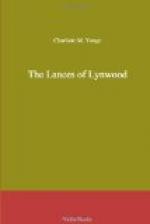The Black Prince himself occupied the centre, his brother John at his left hand, and at his right, a person whom both this post of honour and the blazonry of his surcoat marked out as the dethroned King of Castile. Pedro the Cruel had not, however, the forbidding countenance which imagination would ascribe to him; his features were of the fair and noble type of the old royal Gothic race of Spain; he had a profusion of flaxen hair, and large blue eyes, rather too prominent, and but for his receding forehead, and the expression of his lips, he would have been a handsome man of princely mien. Something, too, there was of fear, something of a scowl; he seemed to shrink from the open and manly demeanour of Edward, and to turn with greater ease to converse with John, who, less lofty in character than his brother, better suited his nature.
There, too, Eustace beheld the stalwart form and rugged features of Sir John Chandos; the slender figure and dark sparkling southern face of the Captal de Buch; the rough joyous boon-companion visage of Sir Hugh Calverly, the free-booting warrior; the youthful form of the young step-son of the Prince, Lord Thomas Holland; the rude features of the Breton Knight, Sir Oliver de Clisson, soon to be the bitterest foe of the standard beneath which he was now fighting. Many were there whose renown had charmed the ears of the young Squire of Lynwood Keep, and he looked on the scene with the eagerness with which he would have watched some favourite romance suddenly done into life and action.
“Eustace! What, Eustace, in a trance?” said d’Aubricour. “Waken, and carry this trencher of beef to your brother. Best that you should do it,” he added in a low voice, taking up a flask of wine, “and save our comrade from at once making himself a laughing-stock.”
The discontented glance with which Leonard’s eyes followed his fellow Squires, did not pass unobserved by a person with whom d’Aubricour had exchanged a few words, a squarely-made, dark-visaged man, with a thick black beard, and a huge scar which had obliterated one eye; his equipment was that of a Squire, but instead of, like others of the same degree, attending on the guests at the upper table, he sat carelessly sideways on the bench, with one elbow on the board.
“You gaze after that trencher as if you wished your turn was come,” said he, in a patois of English and French, which Leonard could easily understand, although he had always turned a deaf ear to Gaston’s attempts to instruct him in the latter language. However, a grunt was his only reply.
“Or,” pursued the Squire, “have you any fancy for carrying it yourself? I, for my part, think we are well quit of the trouble.”
“Why, ay,” said Leonard, “but I trow I have as much right to serve at the Prince’s table as dainty Master Eustace. My father had never put me under Sir Reginald’s charge, had he deemed I should be kept here among the serving-men.”




